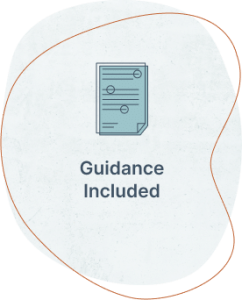Search
Affordable legal document templates written by experienced practising lawyers trusted by UK businesses and beyond
- Guidance notes included
- No hidden extras
- Easily customisable
Create your document in 3 Easy Steps
- Download
- Customise
- Share & Sign
Advance Subscription Agreement Template
An Advance Subscription Agreement is a quick and relatively inexpensive way for a company to raise investment prior to an anticipated investment round. Select your Advance Subscription Agreement Template depending on the proposed terms.
why our
customers value us
“I find what I need easily on the PaperRock website. The guidance is clear, and the documents are as good as the ones I’ve seen from in-house and external law firms. I’d highly recommend PaperRock Documents.”
Gavin, MD | SC Transformation
What is an Advance Subscription Agreement?
Under an advance subscription agreement (ASA):
- an investor provides investment funding to the company in the form of an advance subscription for shares
- the advance subscription will convert into shares in the company in the future on the occurrence of the company’s next funding round (or earlier in certain circumstances)
- the conversion price will be based on the price per share of the company’s next investment round. Depending on the negotiations between the company and the ASA investors, the conversion price could be at an agreed discount to the investment round price and also potentially subject to a cap on the investment round valuation of the company
- as an alternative, the conversion price for an ASA can be an agreed fixed amount, especially where the company is about to conclude an investment round at a known price per share but requires funding for the period prior to the conclusion of the investment round
There are 3 forms:
- Advance Subscription Agreement Percentage Discount – the advance subscription will convert into shares at a discount to the price achieved by the company in its next funding round
- Advance Subscription Agreement Valuation Cap – the advance subscription conversion price will be subject to a cap on the company valuation in its next funding round, protecting the advance subscription investors from a potentially high future valuation
- Advance Subscription Agreement Fixed Price – the advance subscription will convert into shares at an agreed fixed price
What is the purpose of an Advance Subscription Agreement?
The aim of an ASA is to enable a company to raise investment funds quickly, ahead of a future anticipated investment round and on relatively simple terms from a legal perspective. An advance subscription agreement enables this to happen before the company valuation for that investment round is fixed and prior to the company going through the full legal process which an investment round requires.
The company can enter into a number of advance subscription agreements on the same terms with different ASA investors, all of which then convert into shares in the company on the closing of the investment round.
What are the advantages of an Advance Subscription Agreement?
For ASA investors, the benefits of an ASA include:
- speed and cost: ASA investors do not have to negotiate detailed legal terms for their investment (or pay lawyers to do so) – when the advance subscription converts into shares, the ASA investors benefit from the investment terms negotiated for the investment round
- valuation: ASA investors do not have to come to their own view on the current company valuation – they can effectively piggy-back off the company valuation at the next funding round
- discount: the ASA can provide that the shares issued to ASA investors on the closing of the next funding round are priced at a percentage discount to the share price of that funding round
- valuation cap: to protect ASA investors from the future funding round being at too high a company valuation, the ASA can include a valuation cap (though this will need to be fixed at the time that the ASA is entered into)
- SEIS/EIS reliefs: ASAs (on conversion into shares) can qualify for SEIS/EIS tax reliefs if the ASA terms meet HMRC’s requirements for advance subscription agreements (and assuming the company and the investor both meet the usual eligibility requirements for SEIS/EIS reliefs)
For the target company, the benefits of an ASA include:
- timing and cost: a company can simply and quickly raise funds under one or more ASAs, which is particularly important for start-up companies or companies which are running out of cash prior to an investment round. Funding can be received from a series of ASA investors, without having to wait until the full legal documents required under a formal funding round have been prepared, negotiated and agreed with investors
- valuation deferral: deferring a company valuation by raising money under ASAs may result in the founders of the company being diluted less in the future than they might have been by agreeing to an early valuation
- SEIS/EIS reliefs: being able to offer investment which may qualify for SEIS/EIS tax reliefs increases the range of potential investors for the company
What are the disadvantages of an Advance Subscription Agreement?
For an ASA investor, the downsides of an ASA include:
- risk: as a future payment for shares, the investment is not treated as debt, is not repayable and does not carry interest. An alternative form of investment would be a convertible loan, which is both repayable and can bear interest but which will not qualify for SEIS/EIS tax reliefs
- long-stop date conversion: an ASA will usually include a long-stop date at which, if an investment round has not then been completed, the advance subscription will convert into shares at an agreed default valuation of the company
- insolvency: on insolvency of the company, the holders of ASAs will not rank with the ordinary creditors of the company but equally with shareholders. Had the investment been made by way of convertible loan, the ASA investors would rank equally with other ordinary creditors
For the target company, the existence of one or more ASAs may have a negative impact on the future investment round. Investors in the funding round may reduce their valuation of the company to take into account the discounted price and any valuation cap which the company may have agreed with ASA investors, resulting in a lower company valuation pre-investment and increased dilution for the founders and other existing shareholders.
What terms are negotiated prior to signing an ASA?
ASAs can be negotiated and signed relatively quickly compared to other investment arrangements. Nevertheless, there are a number of terms which will need to be discussed and agreed between ASA investors and the company before the ASA can be entered into. These include (and depending on the discussions and negotiations between the company and ASA investors):
- discount rate: the discounted price per share (expressed as a percentage) at which the holders of ASAs will receive shares in the future funding round
- valuation cap: whether the ASA should contain a valuation cap on a future funding round (to protect ASA investors from a high valuation)
- qualifying financing round: the minimum amount of funding which a company must raise before that funding round will count as the future funding round under the ASA which results in the conversion of the advance subscription into shares
- long-stop date: the long-stop date after which (and in the absence of a prior qualifying financing round) the ASA will automatically convert into shares, together with the default conversion price/valuation which would then apply
What is HMRC guidance on ASAs?
HMRC has issued guidance on ASAs and their use as qualifying SEIS/EIS investment arrangements. A company can also apply to HMRC for advance assurance before the ASA is entered into. In summary, the HMRC guidance includes the following:
- ASA terms should not be complex – the more complex the ASA, the higher the risk that qualification rules for SEIS/EIS relief will not be met
- the ASA should not offer other benefits for the investor, such as investor protections
- the advance subscription should not be a loan or used as a means of converting a debt or other obligation to shares
- the advance subscription should not bear interest
- the company will need to demonstrate how the timing and terms of the ASA fits into the company’s business plan and its planned expenditure on growth and development
- the ASA should not permit the advance agreement to be refunded under any circumstances
- the ASA should not be capable of being varied, cancelled or assigned
- the ASA should have a longstop date by which the shares must be issued. HMRC expects this to be not more than 6 months from the date of the ASA











